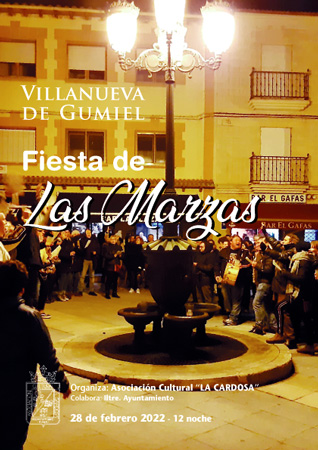Gumersindo Ontañón Ontañón. Monday, February 28, 2022, this year if nothing and no one prevents it, the song of the marches will return to the streets and squares of Villanueva. If we remember the last two years: 2020, it was one of the most massive acts that are remembered on the day of the marches in our town, several factors influenced: the good temperature and the fact of being a weekend which attracted numerous public.
In 2021, on the contrary, and due to the pandemic, the panorama changed completely, instead of being a face-to-face event, it was virtual; Of course, we must recognize the good initiative and work by the Board of the Cultural and Sports Association La Cardosa, and participants, thus taking the songs to the homes of Villanovenses.
In this 2022, everything seems in principle that it will develop normally, although when doing this work nothing can be ventured. What is clear is that they will be quiet marches without crowds; yes, with the same illusion and enthusiasm as always. It is true that on this occasion they will coincide with the carnival, so the schoolchildren will also liven up the party by not having to get up early. The unconditional ones will not fail so there will also be competition to see who sings better and with more force of the two groups, it will not matter much that it is not the most propitious day for this celebration, but tradition says that the marches are sung on the last day February and so it will be in Villanueva de Gumiel.
Roman Gods and Marzas
After this introduction and with the idea of learning more about the history and origin of marzas, I am going to refer to the Dictionary of Greek and Roman Antiquities by Charles Victor and Edmon Saglio. It is a French dictionary published in 10 volumes between the end of the 19th century and the beginning of the 20th, where they deal with various topics, arts, religion, customs and many more.
As we know, a large part of European culture in general and of Spanish culture in particular come from classical cultures, including Roman culture. It is convenient, therefore, to take into account that apart from knowing that the noun marzas comes from the word March and, in turn, also knowing that precisely this month the Romans dedicated it to the god Mars. This would be the preamble, from here the consideration and the most characteristic fact about this god, is that the Romans placed under his protection and invocation the first month of spring, as has been pointed out on several occasions where the civil and religious month began. , mensis martius, until the arrival of Emperor Julius Caesar.

Click to enlarge | The Marzas
–
It should also be noted that no other month of the year except January, Ianuarius, in Latin, has received the name of any divinity, except for the first day of January, dedicated to Ianus (Janus), god protector of doors, later passed to the category of public god; he dedicated a temple to him whose doors were only closed
in time of peace and he was considered god of all principles, including the first day of the Ianuarius year; of the Kalendas first days of each month; of the first morning hours of the day and the beginning of all things.
Thus, the ceremonies began at the end of February, the last day of the past year, which had been completed with purifications and offerings to the dead. On the 27th of this month the first equirria took place, they were festivals of Ancient Rome celebrated in honor of Mars, god of war, and on March 14, the day of the second equirria, which generally consisted of horse races in the field of Mars. The kalendas of March, which are the first day of the Roman month, were specially consecrated to the god; according to the calendar of Philocalus it shows how this day is considered as the day of the anniversary of his birth, a belief that has its origin in the fact that it was the first day of the month placed under his name.
share it
This article was published on February 28, Europe/Madrid 2022 at 4:36 am and is filed under Culture. You can subscribe to comments in the RSS 2.0 feed. You can Write a commentor trackback from your own website.
–



